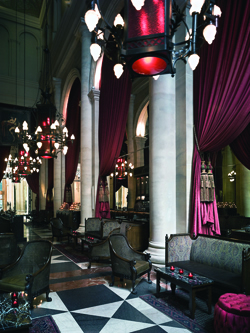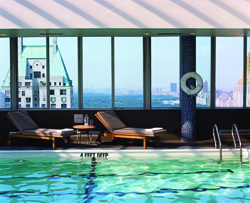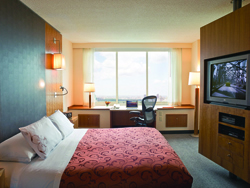- Home
- Media Kit
- Current Issue
- Past Issues
- Ad Specs-Submission
- Ad Print Settings
- Reprints (PDF)
- Photo Specifications (PDF)
- Contact Us

![]()
ONLINE

Optimistic About New York
Editors’ Note
Steven Pipes began his career with Le Meridien Hotels in July 1983, when he joined Le Meridien in San Francisco as Front Office Manager. He was Resident Manager for two years at Le Meridien Vancouver, then General Manager of Le Meridien in Athens, Greece, and two years later, General Manager of Le Parker Meridien New York where he is now Managing Director. Since 1994, Pipes has also served as Managing Director and Vice President of The Jack Parker Corporation, the parent company of Le Parker Meridien New York. Pipes received his bachelor’s degree in hotel administration from Cornell University.
Company Brief
The Jack Parker Corporation (www.thejackparkercorporation.com) is a family-owned company founded in 1955 that has designed, built, and managed more than 15,000 residences, including high-rise luxury rentals, condominiums, and single-family homes, located throughout the Northeast and Florida. The company’s hotel division comprises Manhattan’s Le Parker Meridien New York, the Parker Palm Springs in California, and the Holiday Inn in Ronkonkoma, New York. The modern yet elegant Le Parker Meridien, situated on West 57th Street, boasts 731 rooms and suites and offers three restaurants, Knave – an espresso bar by day and bar by night, a 9,000-square-foot banquet space, rooftop pool, and a fully equipped spa and fitness center.
In this challenging economic environment, the hotel industry has been hit very hard. How much of an impact have you seen broadly on New York City, and has the market stabilized?
New York City has been hit very hard, but we also grew at an astronomical rate year after year; we were at a very high point so we had further to fall. What is unique to New York and select other cities is that you can create demand through the efforts of individual hotels and the community of hotels, so we’re able to drive business. We’re running at very high occupancies and even exceeding last year’s occupancy numbers. The rates are not what they were a year or two ago, but occupancy is the leading indicator, and rates will follow. It will take time to get back to where we were in 2007 and the early part of 2008, but we can be reasonably optimistic about the future of business in New York.

Knave lounge
Many talk about rate integrity, but you have the reality of occupancy as well. How challenging is it to balance rate and occupancy, and will you reach a point where you can bring those rates back up?
Rate integrity is nonsense. The fundamental of our economy is capitalism, and the fundamentals of capitalism are supply and demand. So it would be nice if we could do price fixing and say there’s rate integrity, but it’s only academics who can sit in their ivory towers and talk about how we should not discount rates. Now there are some markets where you can create demand and others where you cannot. If we were sitting in a market where we could not create demand, we’d be foolish to discount rates. In New York City, discounting rates creates demand and that’s why hotels are running at high occupancies right now. It’s always much harder to bring rates up than it is to bring them down. It will take time, but it will happen.
Does the competitive landscape change in a market like this, and is there not much of a differentiation between one star and five stars?
We call it the accordion theory, which means when the market is very strong, the accordion stretches out and there is a huge differential in pricing between the top of the market and the bottom of the market. When the market gets back, the accordion squishes in, and there has been an enormous squishing in. If you look at the difference in rates between a two-star hotel and a four-star hotel, it has narrowed dramatically. So in many regards, the lower priced hotels have fared much better during this downturn; as you go up the market, it’s gotten that much worse. So conversely, when the market improves, we’ll see the accordion stretch back out.

Penthouse pool with skyline views
How close is the coordination between the New York property and your sister property in Palm Springs, California, and do they have a similar clientele?
Since I oversee that property, there is great coordination between the two. The economy in California has been hit very hard. What has aided us is that while we have a very unique property, it is not perceived as being over-the-top opulent, so if a company wants to have their meeting there, they’re not viewed as being spendthrift.
In addition, the majority of business at that property is from California, because we’re in driving distance of all of Southern California’s major populations, so we benefited from that as a lot of corporations have chosen not to go to Hawaii or Europe.
On the transient side, we’re still a great weekend destination for most of them and it’s an easy drive and relative to a lot of places, we’re reasonably priced. So we’re certainly down like everybody is, but it’s held up reasonably well.

Standard room – well-equiped for work or relaxation
In New York, you’ve led in the industry with your food and beverage product. Did you take that philosophy to Palm Springs?
Yes, but it goes beyond just the food and beverage outlets; it really is the very core of what the resort is. Our philosophy going into redeveloping that property was that there are very few interesting resorts in the country. For the most part, they can be very luxurious and well placed, but they’re very boring. What we’ve tried to do is create luxury that’s not stuffy. If your determination of a good hotel is a 500-square-foot bathroom with a gold-plated faucet, that’s not who we are. We want you to enjoy the grounds, the pools, and even meeting people. I have never eaten at our nighttime restaurant Mister Parker’s without also having a conversation with somebody at another table.
We’ve tried to create the feel of an estate rather than a hotel, so our rooms are much more residential feeling, and our staff is super friendly. It’s probably the hardest hotel to describe because it has a vibe that’s unique. If you step out onto the grounds in the daytime, it’s one feeling, and if you step out at night, it’s a completely different feeling – it’s magical.
What is it about your experience here that’s kept it fresh?
I’m not only given latitude to innovate, create, and make changes, but I’m encouraged and pushed to do so. I also have the ability to not only oversee multiple properties but to be involved in looking for acquisitions, so there’s huge variety in what I do, which means nothing is routine.